On the National Heroes on the Screen: Supporting the Backbone of the Nation from "Dangkou Fengyun"
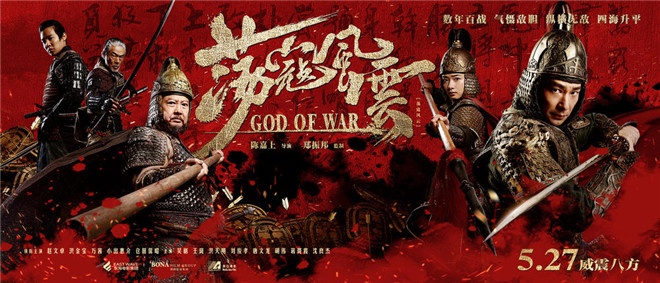
Poster of "Dangkou Fengyun"
Special feature of 1905 film network In the splendid history of the Chinese nation for 5,000 years, there have been countless epic national heroes, and their stories have been constantly reshaped in various artistic forms. Since the birth of China’s films, there have been endless films praising national heroes. This year, there are still many films on this theme in China film market. In addition to the hit "Wandering in the Wind", films based on the Sino-French War in the late Qing Dynasty will also be shown in the summer file. This gives us a chance to review the light and shadow and capture all the great national hero images on the screen.
China has a vast territory since ancient times, and wars have been going on constantly, so a fighting hero like Yue Fei has emerged. With the rapid expansion of western forces, the Ming and Qing Dynasties, where wars were frequent, became a historical opportunity for national heroes to be tempered and born in the war. The story of the movie Dangkou Fengyun took place during the Jiajing period of the Ming Dynasty. The Japanese pirates constantly harassed and plundered the southeast coast of China, and the government troops were helpless in the face of foreign pirates, and the local people were in dire straits. Qi Jiguang, a young military attache from a military family, came to Zhejiang to take charge of the military affairs against Japan. In order to organize a truly effective army in the face of the enemy, Qi Jiguang recruited brave miners from the local area for strict training, and formed the "Qijiajun" which made the enemy fear.
Qi Jiguang has both civil and military skills in history, so it is wise to choose Chiu Man-Cheuk, who is a martial arts player with elegant temperament, to play in the movie "Dangkou Fengyun". Yu Dayou, another famous anti-Japanese actor in the film, is played by Sammo Hung, a veteran action film director and actor. The incarnation of the two kung fu superstars as historical celebrities has undoubtedly enhanced the visibility of the film from a commercial point of view. However, the point of view of "Wandering in the Wind" is not limited to this. Restoring history through grand war scenes is the focus of the film. Director Chen Jiashang studied Qi Jiguang’s relevant historical materials for nearly ten years, and finally chose Qi Jiguang’s experience of training Qi Jiajun as a "special force" as a breakthrough point to show the fighting spirit inspired by the generals, soldiers and coastal people in the face of the Japanese invasion.
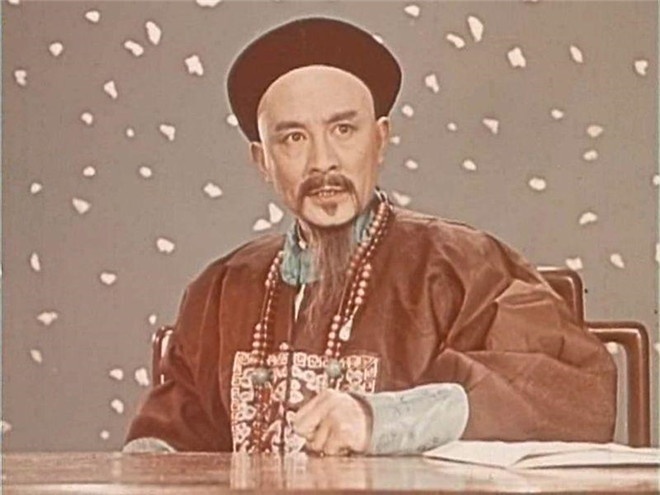
Stills of Lin Zexu
Compared with those national heroes who became famous for their martial arts, Destruction of Opium at Humen’s Lin Zexu became a widely spread example for his boldness and courage. Lin Zexu’s deeds have been put on the big screen many times. The two most influential editions are Lin Zexu in 1959 and directed by Xie Jin in 1997. The two films are respectively starred by Zhao Dan, the earliest "national male god" in China films, and Bao Guoan, who is well-known for his role of Cao Cao in the TV series Romance of the Three Kingdoms. Lin Zexu, played by Zhao Dan, is elegant and indifferent, while Bao Guoan emphasizes his concern for the country and the people. There are many subtle differences in temperament between the two versions of Lin Zexu, but on the whole, they all depict Lin Zexu’s upright and unyielding national character in the face of political enemies and aggressors from different angles.
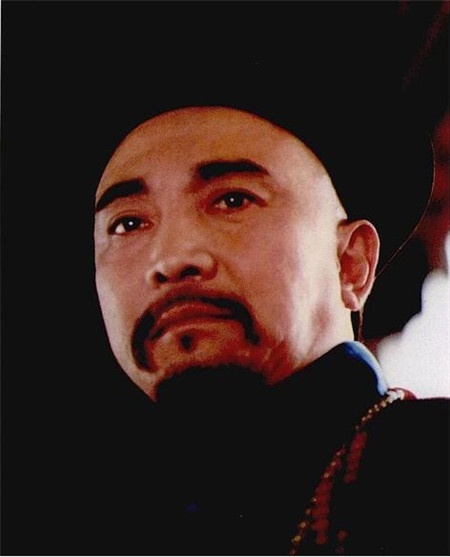
Stills of Opium War
In particular, the film Opium War, which creatively added a large section of English drama in all English, examined the situation at that time from a different perspective. The film was released on the eve of Hong Kong’s return to China. At that time, after more than 20 years of reform and opening up, China’s national strength increased greatly, and people’s material and cultural lives were much richer than before. As the film says, only when a nation really stands up can it face up to and reflect on its humiliating history. Many times, the film described the smoking ban situation at that time with smoky and dim scenes, and at the same time, it also alluded to the unbearable political environment. Local officials committed crimes and bullied their superiors and deluded their subordinates everywhere. In this case of corruption and decline, the film vividly depicts a loyal and wise veteran Lin Zexu, and his "loyalty" and "righteousness" are also particularly deplorable.
Lin Zexu’s greatest historical achievement lies not only in hosting Destruction of Opium at Humen to show Chinese’s determination and perseverance, but also in his inspiration to the later generations to "open their eyes to the world". Under the guidance of this thought, the Westernization Movement of "learning from foreigners and strengthening ourselves" rose, and the Qing government set up the strongest fleet in Asia — — Beiyang navy. In this fleet, a heroic hero was born, whose name was Deng Shichang.
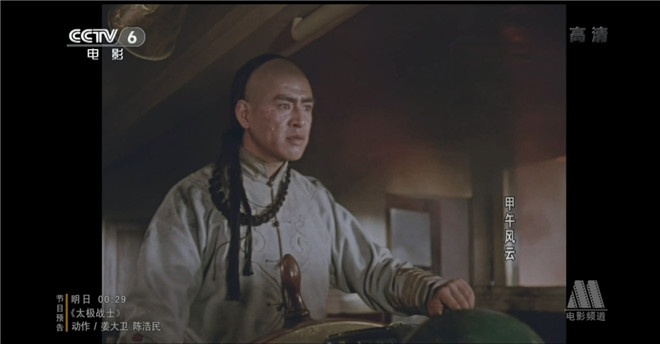
Stills of the Sino-Japanese War
In 1894, in the Sino-Japanese Lunar New Year, the Japanese naval joint fleet broke into the waters of China and challenged the Beiyang Navy in China. The film "Sino-Japanese War" released in 1962 reflects this history. It focuses on portraying the heroic image of Deng Shichang, the leader of Zhiyuan Ship, and contrasts it with Li Hongzhang and Fang Boqian, who are weak and afraid of war. The film is starred by actor Li Moran, who successfully created the hero Deng Shichang, a classic character in the history of China film, with his generous figure and resolute temperament. Although the ship in the film is different from the real history due to the limitation of technical level, the thrilling naval battle scene left a deep impression on that generation of China audience. Countless people feel sorry for the complete defeat of Beiyang Navy, but Deng Shichang, played by Li Moran, commanded the scarred Zhiyuan to crash into the joint fleet’s Yoshino, and this scene showed the spirit of death, which still deeply inspired the audience.
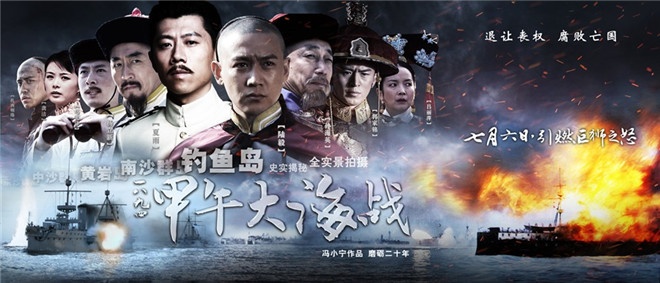
Poster of 1894 Sino-Japanese War
Fifty years after the release of "The Storm of the Sino-Japanese War", the audience welcomed the movie "1894 Sino-Japanese War" with the same theme, which was shot by the famous war film director Feng Xiaoning. The film increased the feud between the protagonist Deng Shichang and the enemy officer Ito Sukeyuki before the naval battle, and strengthened the dramatic tension of the whole story. Most of the main actors in the film showed credible acting skills. Although as a film released in 2012, its costume props and war scenes are still far from those of the current large-scale commercial films, the film has created a different kind of tragic, and this tragic comes from the appeal of national heroes themselves.
The Opium War made China lose Hongkong, and the failure of the Sino-Japanese War of 1894-1895 forced China to admit the Japanese occupation of Taiwan Province. It was not until half a century later that the people of China won an all-round victory in War of Resistance against Japanese Aggression that Taiwan Province was recovered. And this troubled treasure island is not the first time occupied by invaders. In the late Ming and early Qing dynasties, she once fell into the hands of Dutch invaders. The Chinese people on Taiwan Province Island could not bear the exploitation and torture of the Dutch, so they had to turn to the motherland on the other side of the Strait. Zheng Chenggong, as the mainstay of the generals in the Southern Ming Dynasty, organized a fleet to sail for Taiwan Province without hesitation after learning what happened to his compatriots, and with the cooperation of compatriots on the island, he defeated the cunning and ferocious enemy and brought Taiwan Province back to China.
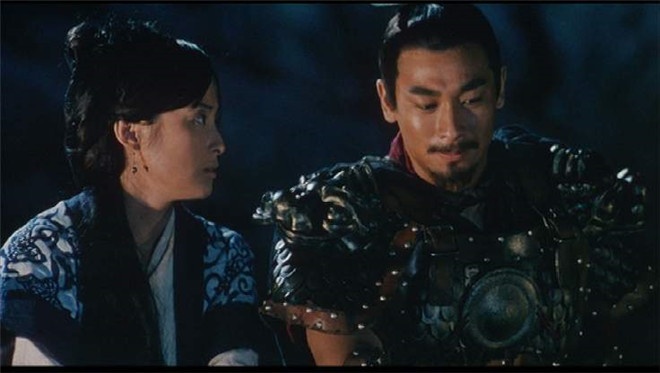
Stills of Hero Zheng Chenggong
Zheng Chenggong’s story was put on the screen by director Wu Ziniu in 2001. The film "Hero Zheng Chenggong" also stars Chiu Man-Cheuk. From Qi Jiguang to Zheng Chenggong, it seems that Chiu Man-Cheuk really has some unique temperament, which accords with the audience’s traditional cognition of national heroes. Compared with Qi Jiguang’s high spirits, the film adds a sadness and resentment to Zheng Chenggong’s ruin. Under Chiu Man-Cheuk’s meticulous interpretation, the heroes are full of masculine beauty, and also perfectly express the people on both sides of the Taiwan Strait’s deep affection and their common desire for reunification.
Before the Japanese rebellion in the Ming Dynasty, China rarely encountered foreign enemies from the sea; In the Qing Dynasty after the Ming Dynasty, just like the Dutch invaders in Hero Zheng Chenggong, more difficult enemies began to cross the sea from further places. The movie The Battle of the Dragons, which will be released in the summer, is such a story background. In the 1980s, French troops from the European continent brazenly invaded China’s vassal Viet Nam, and approached China’s border, killing China’s border people, and the Sino-French war broke out. In the anti-aggression war, including this war in modern times, China is no longer confronted with an enemy as savage and backward as the Japanese pirates in the Ming Dynasty, but a great power with more advanced weapons and systems. It is under this circumstance that China’s soldiers and civilians, led by veteran Feng Zicai, have shown their tenacious resistance and national integrity.
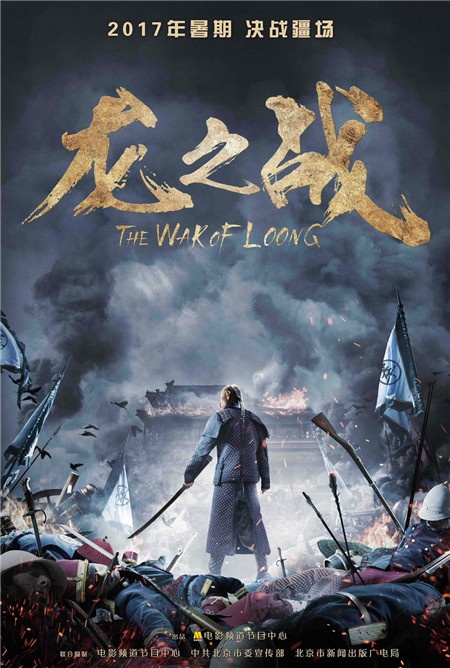
"Battle of the Dragon" poster
In the movie Battle of the Dragons, in order to save the situation of losing ground, the Qing government reactivated Feng Zicai, who was old and retired. And he didn’t live up to the trust of the country. At the age of nearly 70, he personally fought with a knife and gun, bravely fighting the tall and strong black soldiers of the French army, and finally led the Qing army to win the victory in Zhennan. Old general Feng Zicai is also a well-deserved national hero.
From The Storm of the Sino-Japanese War to The Battle of the Dragons, generations of filmmakers have created vivid and touching images of national heroes on the big screen. For thousands of years, it is under the inspiration of these heroes that countless Chinese sons and daughters have fought for the land under their feet unswervingly and fearlessly. With the rising of China’s economy and the continuous improvement of film technology, we will be able to make better national hero films, not forgetting history and praising their great national spirit. This is not only the needs of movie audiences, but also the spiritual needs of the nation, because it is these national heroes who prop up the unyielding backbone of the Chinese nation.